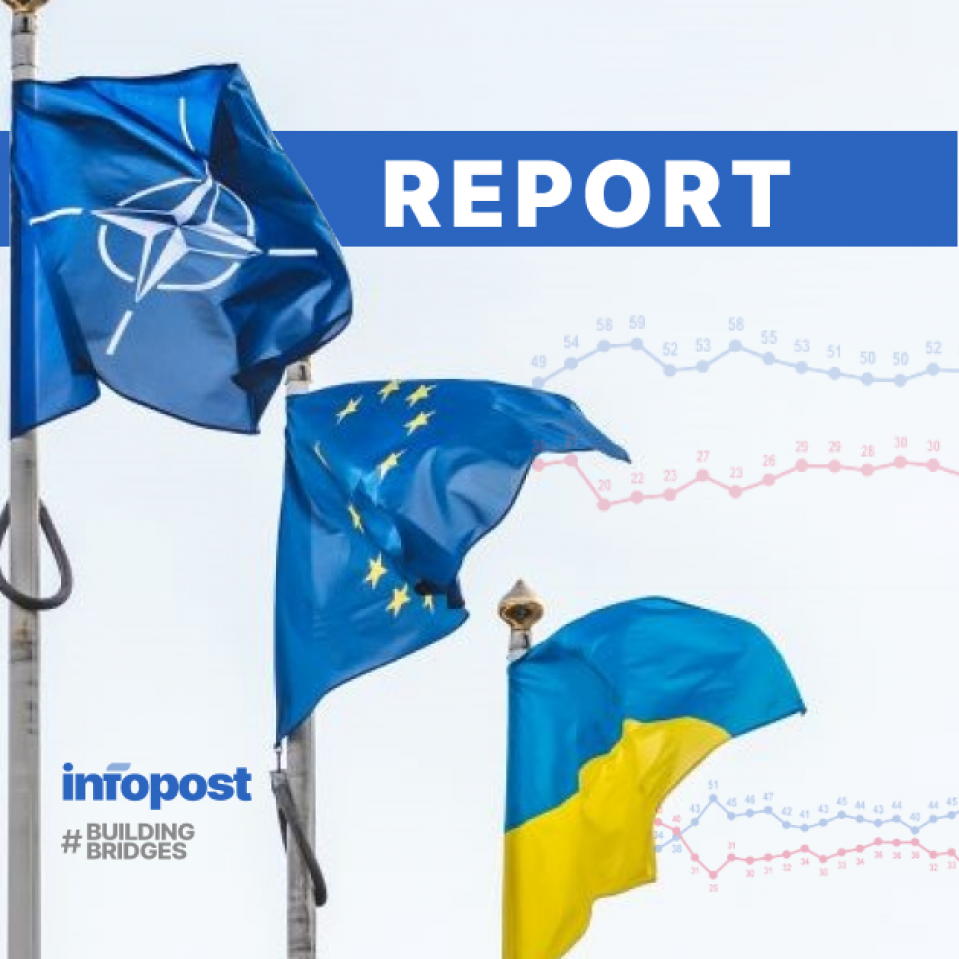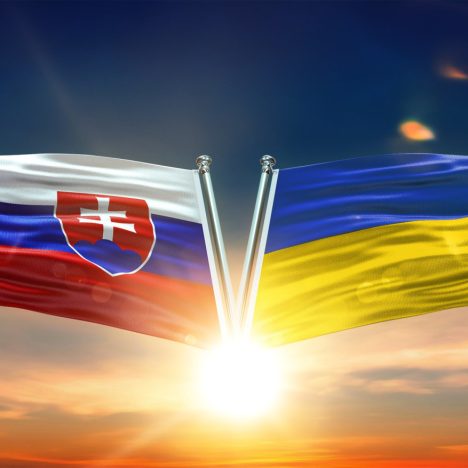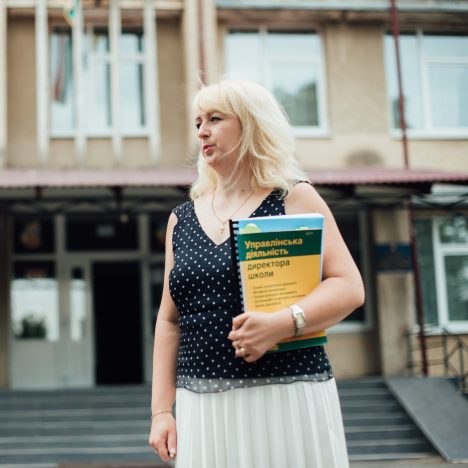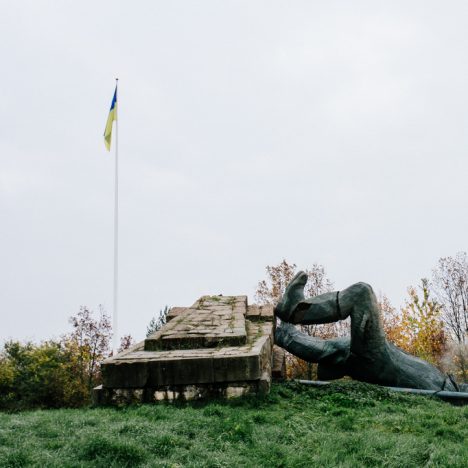The key one risk in such a case is the over-inflated expectations of Ukrainian society, especially regarding timeline, conditions and impact of Ukraine’s integration into the EU and NATO in wartime.
Hence, derivative risks and even threats are the weak expectation management by Ukrainian elites and high motivation, and even temptation for them to exploit this topic in internal political fights.
So, it is worth to speak about the risk of kind of “balkanization” and “orbanization” of Ukraine’s integration into the EU and NATO in mid and long terms.
EU and NATO in Ukraine: On the top of the public agenda, strongly linked with security and war
Throughout 2023, the EU and NATO accession remained one of the leading topics in Ukraine’s media space, strongly interconnected to each other.
This is determined due to both narratives and timelines, and proved by the analysis of the 100 most engaged Facebook posts on the EU and NATO in 2023, which were selected within this study based on keyword matching in the Ukrainian (and partly Russian) language with help of the CrowdTangle tool.

Timeline level. Given that in 2022 Ukraine applied for membership in both the EU and NATO, and even received candidate status from the EU, it is natural that Ukraine paid great attention and expectations to the key EU and NATO summits scheduled for 2023.
Thus, in the first half of 2023, the public discourse on foreign policy of Ukraine was dominated by the topic of NATO, especially before and after the Vilnius summit (July 11-12). While the second half of last year, especially in the run-up to the EU summit (December 14-15), was dominated by the topic of EU accession. In both cases, the public discourse in Ukraine was united by expectations of progress toward Ukraine’s membership in these alliances, including an official invitation to NATO and a decision to open negotiations on EU membership.
At the same time, it is important to note that throughout 2023 the EU and NATO topics do not compete with the key one of the public discourse in Ukraine, which is still the Russian invasion and its aspects (massive Russian shelling, Ukrainian counteroffensive, etc.), but is closely related to it and complements this key topic through the security dimension.
Another important detail, which is confirmed by the analysis of the aforementioned sample of the 100 most engaged posts on Facebook, is that Ukraine’s accession to the EU and NATO is not linked in the media discourse of Ukraine to the accession of Moldova, North Macedonia (in the case of the EU), or the Western Balkans in general. Of course, this interconnection exists in the expert community in Ukraine, especially in the context of the EU and at the level of the Ukraine-Moldova duo (before the Russian invasion, it was in the context of the “Associated Trio” narrative, i.e. Ukraine-Moldova-Georgia). However, neither Moldova nor any other country is present in the Ukrainian media discourse as a partner or competitor of Ukraine in its accession to the EU and NATO, and the European or Euro-Atlantic integration of these countries is not covered much in Ukraine.
Narrative level. The Russian war against Ukraine and Ukraine’s integration into the EU and NATO are linked now in public discourse by 3 key issues:
- Western financial and military assistance,
- sanctions against Russia and its allies (Iran, China),
- legally binding commitments of the West to Ukraine’s sovereignty against Russian future aggression with relevant support in resources and forces,
- post-war reconstruction of Ukraine.
Due to the facts that after the start of the Russian invasion the EU buys weapons for Ukraine (EPF, European Peace Facility), while NATO has limited itself to a coordinating role in providing military assistance, the typical perception of the EU as “just economic union” and NATO as “a key military one” have changed in Ukraine. In public discourse EU and NATO topics in Ukraine have been linked on issues such as security and Russian aggression, appearing at the spotlight of the narrative battle on “peace”, “victory”, “new world order”.
As of September – October 2023 59% of Ukrainians believe that Ukraine’s membership in the EU is important for long-term security, and another 57% believed it was important for Ukraine’s economic prospects.
In fact, such a shift in perception of the EU and NATO topics has additional background. Russia’s aggression against Ukraine in 2014, which began with the occupation of Crimea and parts of eastern Ukraine, was started by the Kremlin during the Revolution of Dignity (another title is “Euromaidan”) in Ukraine, which in turn began after the pro-Russian Yanukovych regime refused to sign the Association Agreement with the EU and was held under the slogans of EU integration. At that time, NATO accession of Ukraine was out of the agenda, and Ukraine’s membership in alliance was a divisive issue: as of March 2014 43% of Ukrainians were against NATO accession, and 34% in favor. So, Russian aggression in Ukraine’s public discourse has been tied to the EU topic far before 2022, when Russia has launched the full-scale invasion exploiting the NATO topics as one of the pretexts.
Figures that matter and prove
All these changes in perceptions and narratives about the EU and NATO in Ukraine are clearly visible in the results of sociological surveys.
Let’s start with the megatrend: since 2014, which was even further reinforced in February 2022, the level of support for Ukraine’s accession to the EU and NATO has not only been growing, but has reached unprecedented levels of 80-90% support.
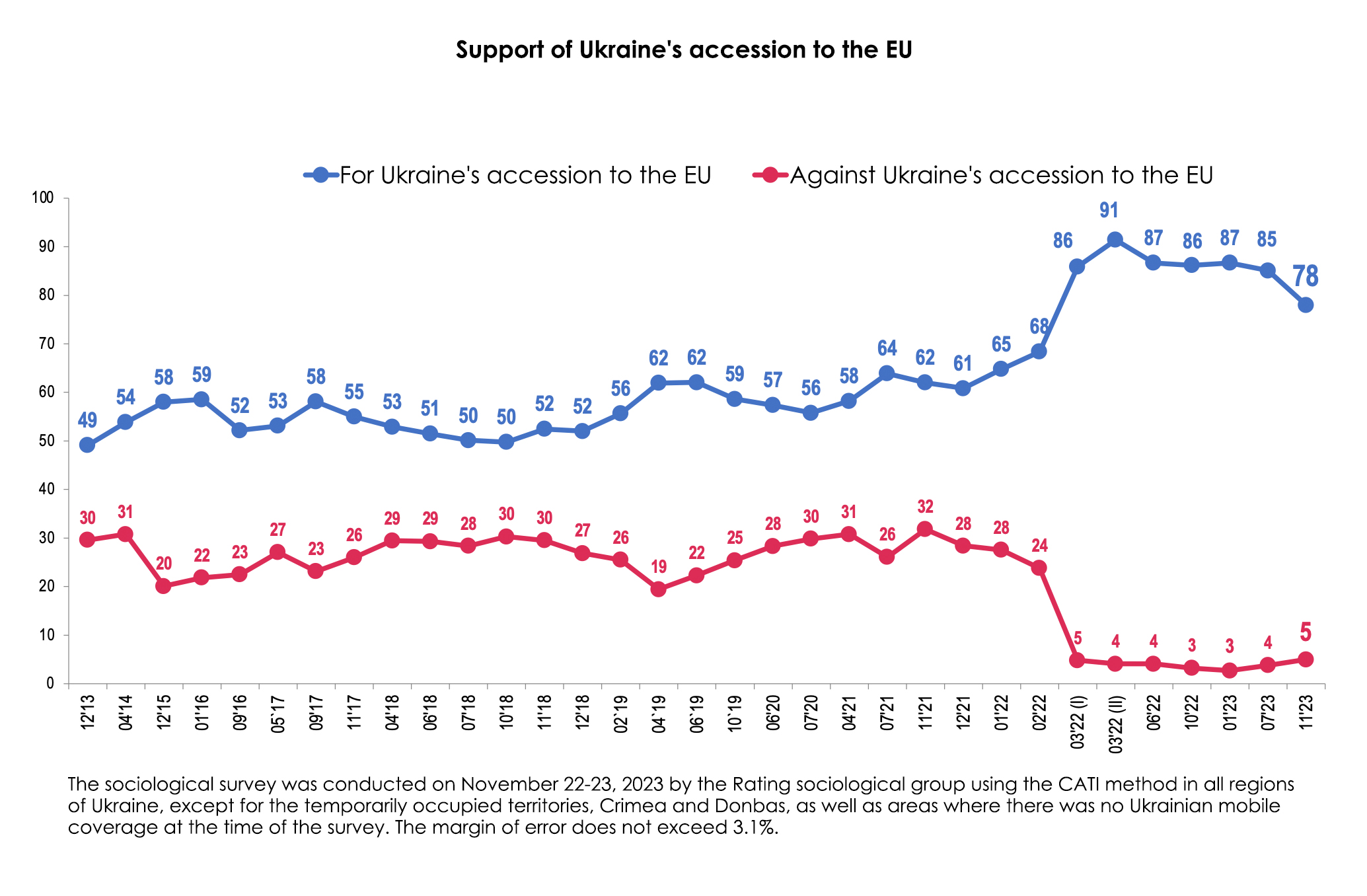
Support of the EU accession: blue – for the accession, red – against. Source ratinggroup.ua
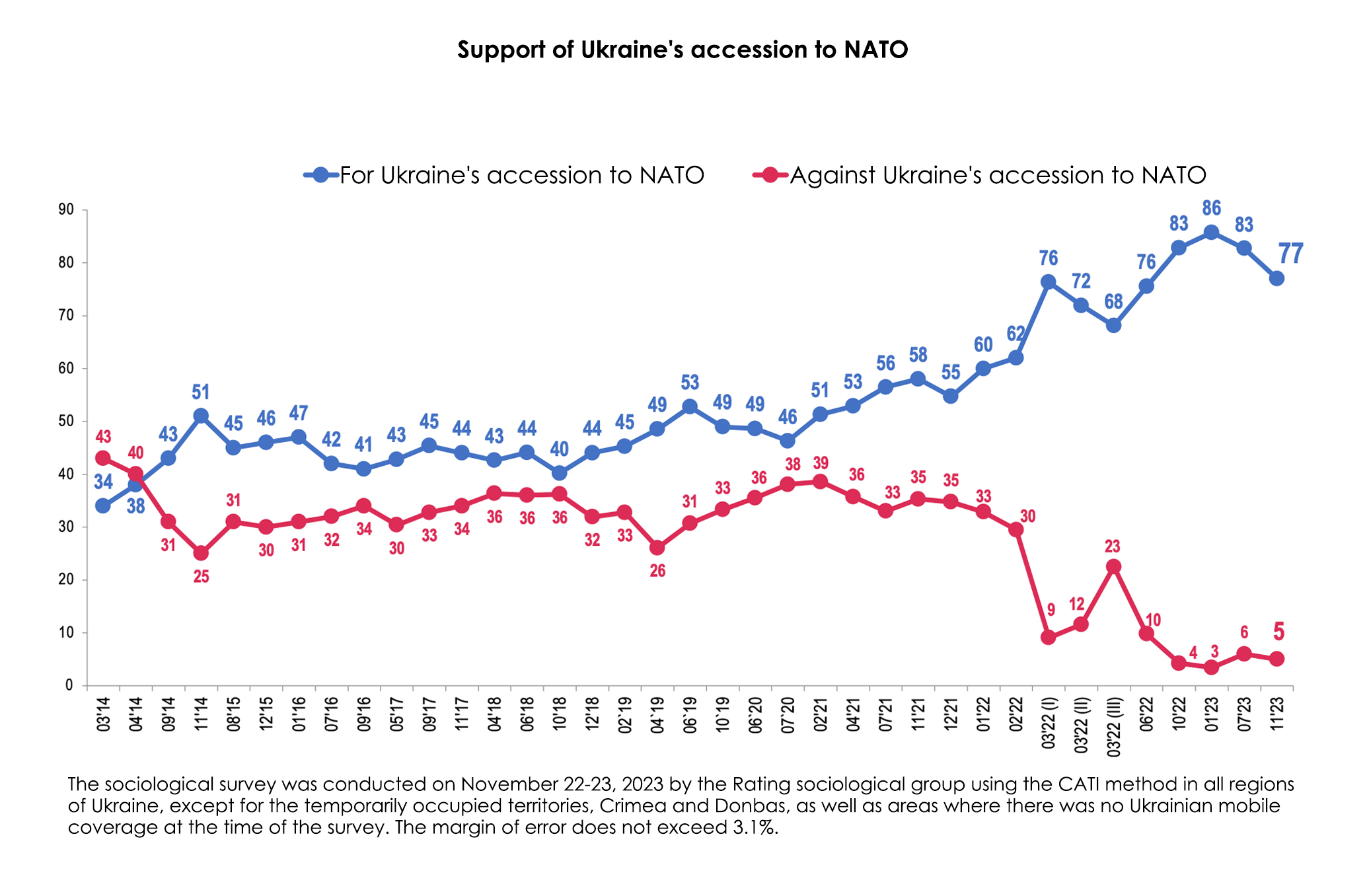
Support of NATO accession: blue – for the accession, red – against. Source ratinggroup.ua
Moreover, public attitudes show that EU and NATO membership have synchronized in terms of indicators and trends, and these issues no longer divide Ukrainian society, but unite it.
Given this level of support for joining both the EU and NATO, it is not surprising that none of the 100 most engaged with Facebook posts in Ukrainian language about either the EU or NATO in 2023, which were selected for this study using the CrowdTangle tool, contained hostile connotations.
This is due to the fact that, on the one hand, none of the major domestic political actors in Ukraine dare to openly pursue anti-EU and anti-NATO rhetoric. The only exception is the controversial politician Oleksiy Arestovych, who, after leaving Ukraine, began spreading anti-Western and pro-Russian narratives. By the way, the level of trust in Oleksiy Arestovych has dropped almost 6 times over the year – from 62% in May 2022 to 11% in December 2023.
On the other hand, the penetration and influence of Russian disinformation from the outside is negligible due to the peculiarities of the Ukrainian media space after the Russian invasion, as described in detail in a separate report by IRI.
Two more important beacons based on the results of the most recent social surveys, which confirm that in the perception of Ukrainians of the EU and NATO there is a clear relationship between joining these alliances and understanding the essence of the war against Russia and winning this war:
-
- as of December 2023 42% of Ukrainians named Ukraine’s accession to NATO for guaranteed protection from another war as one of the key achievements of this war with Russia.
This is the second result next to the punishment of all Russian war criminals (42%) and compensation for all damages caused to the economy and citizens (41.5%). The release of all prisoners and the return of deported Ukrainians are in the first place: 69% of Ukrainians called this point as the main achievement in the current war with Russia.
-
- as of June 2023 the same number of Ukrainians – 14% each – consider it acceptable to give up on joining either the EU or NATO in exchange for an end to Russia’s aggression. This idea is considered unacceptable by 72.8% (EU) and 71.7% (NATO), respectively.
The same trend was confirmed in December 2023: 56.9% of Ukrainians consider it unacceptable to give up joining NATO as a concession in possible negotiations with Russia, and 61% consider it unacceptable to give up joining the EU.
So, the EU and NATO accession for Ukraine now are not just pure geopolitics, choice between Russia and the West, economic benefits, etc, but the core of the existential war for independence, survival of an ethnic and political nation, and decolonization from Russia. This brings us to the kind of grand narrative that Ukraine’s survival as a sovereign and democratic state depends on its accession to both the EU and NATO.
Over-inflated expectations
The situation described above in the Ukrainian media space and public opinion regarding the perception of accession to the EU and NATO could be called ideal, or at least certain.
However, the problem of Ukrainians’ expectations in this context is obvious. These expectations are incredibly high now, both in terms of joining the EU and NATO, and in terms of ending the war.
As of December 2022 (a year before the decision to open negotiations), 30.8% of Ukrainians believed that Ukraine would join the EU in the next 1-2 years; another 24.4% – in the next 4-5 years; 26.9% – as soon as the war ended.
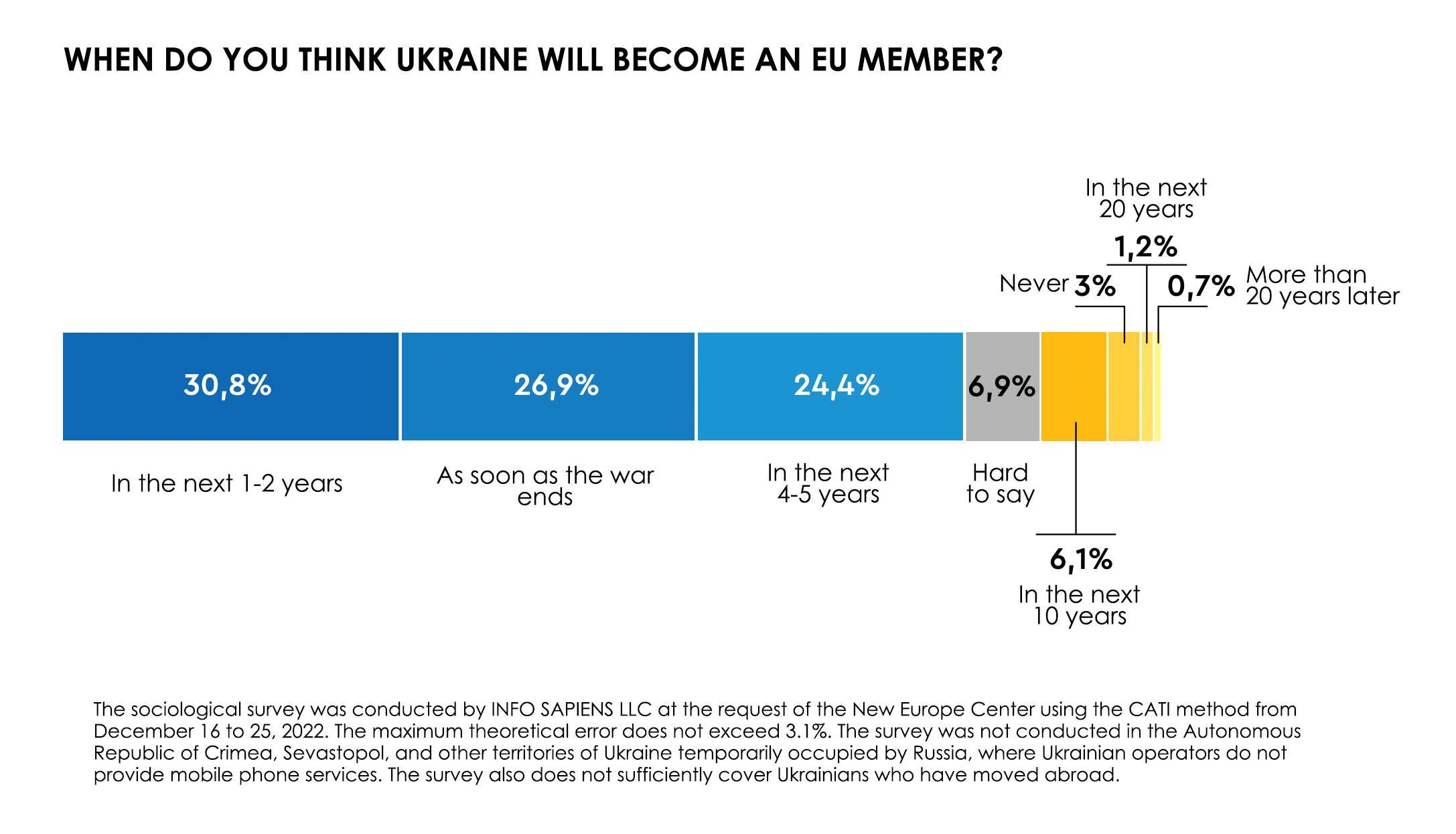
As of December 2023 19.2% of Ukrainians expect Ukraine to join NATO in full at the Washington Summit; a total of 46.3% expect Ukraine to be invited to join NATO, either with or without the accession process.
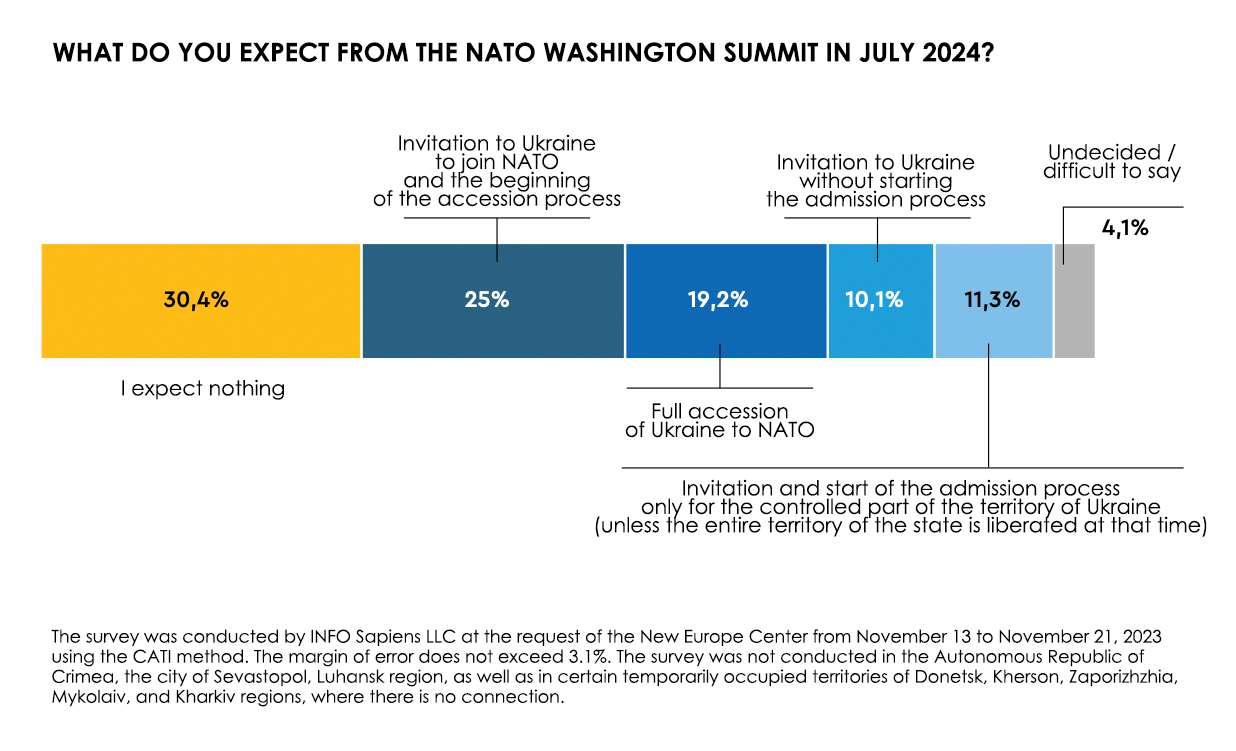
At the same time, as of December 2023 more than half of Ukrainians (58%) believe that Ukraine will win this war in the short term: 6% – in the next few months, 21% – by the summer of 2024, and another 31% – in 1-2 years. In the medium term (3-5 years), 15% of respondents are inclined to win. At the same time, supporters of the most pessimistic scenario, who do not believe that victory will come in their lifetime, are in the absolute minority (2.5%).
Traps
The time trap. It is obvious that Ukraine will not be able to join the EU and NATO in the short term, i.e., in the next 1-2 years. Even in the medium term – 4-5 years – it looks problematic.
The 2030 date announced by European Council President Charles Michel as the year of the new enlargement barely fits the expectations of 24.4% of Ukrainians, although it looks like the most optimistic date from the point of view of the forecast.
In addition, it is important to understand that the threat of additional and stronger disillusionment also lies in the expectation of a quick victory in the war and the strong link in Ukrainian perception between joining the EU and NATO and the war against Russia. A long-term war with Russia is likely to serve as an additional factor for disillusionment with the EU and NATO. Especially taking into consideration that both alliances have already publicly and explicitly stated that it is impossible for Ukraine to join the EU and NATO fully until the war ends.
This narrative connection and the inflated expectations of Ukrainians regarding the EU, NATO, and victory in the war are ideal grounds for various conspiracies, such as “the West does not want Ukraine to join the EU or NATO, so it helps just enough to ensure that Ukraine does not lose the war, but also does not win it.”
The trap of discourse, legitimacy, and policy quality. The unprecedentedly high level of support for Ukraine’s membership in the EU and NATO, as well as the absence of critics of this course, creates the illusion that there is nothing to discuss and educate about the EU and NATO and that such a discussion is not necessary, and that diplomats and bureaucrats will do the rest of the work. Especially now that accession talks with Ukraine have been opened.
The absence of such a discussion not only creates an additional risk as to how well and inclusively Ukraine will implement the reforms necessary for European and Euro-Atlantic integration.
In this regard, two cases from 2023 are illustrative: the adoption of two so-called European integration laws. The first is about the financial monitoring of politically exposed persons (PEPs), and the second is about changing the legislation on ensuring the rights of national minorities. In both cases, the government’s key argument for adopting the draft laws in their current form was that they were necessary to open negotiations on EU accession.
This approach provoked public criticism, which can be summarized as follows: Ukraine is making unnecessary and destructive concessions, saying that the PEP law could almost destroy the Ukrainian civil service, and the new law on minority rights could undo all previous achievements in terms of de-Russification, protection of the Ukrainian language and nation-building.
In the end, in the case of changes to the legislation on the rights of national minorities, the draft law was finalized, submitted to the parliament with changes from virtually all factions, and voted for by 317 votes. Although it was actually about changes to the legislation that Hungary has been demanding for the past 5-6 years and using as an excuse to block integration into the EU and NATO, as well as pro-Russian rhetoric about the oppression of minorities in Ukraine.
Recommendations
Given these public sentiments and the media discourse in Ukraine on EU and NATO topics, it is important for Ukrainian decision makers and their Western partners to do the following:
-
- Initiate and conduct additional qualitative research on how public opinion and public discourse on EU and NATO accession in Ukraine is shaped, in particular, focusing on:
-
- studying such media platforms as Telegram and Tik-Tok, given the potential influence and depth of penetration of Russian, pro-Russian or other malign disinformation on the EU and NATO topic;
- the impact of publications of the leading Western media on shaping narratives and agendas in the Ukrainian media space. Such a need is justified by the trend that the number of skeptical materials about the war and Western support, Ukraine’s accession to the EU and NATO, etc. is growing in these media outlets;
- identification of the non-obvious interdependencies in the level of public perception and narratives between the topic of Ukraine’s accession to the EU and NATO and other critical topics in Ukraine, such as war, mobilization, peace negotiations, security guarantees, etc.;
- studying the moods of certain target audiences in Ukraine, such as farmers, government officials, etc., to explore the protest potential of sensitive target audiences. A good example in this regard is Poland, where there is one of the highest overall support for Ukraine’s membership in the EU in Europe, while farmers and truck drivers are turning into a key protest force on this issue;
- identify narratives and conspiracy theories popular among Ukrainians, whether of Russian or any other origin, that question the feasibility of Ukraine’s accession to the EU and NATO, and then develop strategies and tactics to counter these influences. As an example of such a narrative and conspiracy theorizing: “Joining the EU will destroy Ukrainian agribusiness”.
This will allow for a deeper understanding of the topic, which at first glance looks unambiguously positive and problem-free in terms of public support and approval.
2. To plan and deliver a series of strategic communications campaigns that would balance the over-inflated expectations of Ukrainians in several aspects:
-
- on the timeline of Ukraine’s accession to the EU and NATO;
- on the format of negotiations on Ukraine’s accession to the EU and NATO. In particular, to clarify in the public discourse as much as possible that it is not so much about negotiations as about Ukraine’s adaptation to all possible “club rules” and the need for point concessions as a fair price for the country’s overall success in the EU and NATO.
This communication should be aimed at changing the discourse from expectations and their feeding to a discourse of collaboration and inclusion.
Given the sensitivity of the issue for politicians, this task implies the greatest possible involvement of the expert community and opinion leaders with high recognition and credibility to deliver “bad news” and “hard truth.”
Former Western politicians and influencers who support Ukraine, such as former Polish President Aleksander Kwasniewski, former Slovak Prime Minister Mikulas Dzurinda, and former Lithuanian President Dalia Grybauskaite, could play this role, historian Timothy Snyder, former European Commission President Jose Manuel Barroso, intellectual Anne Applebaum, former Italian Prime Minister Mario Draghi, former Romanian President Traian Basescu, former NATO Secretary General Anders Fogh Rasmussen, and former top-level officials of the alliance.
3. By strategic communications and with the help of civil society, strengthen the public dialogue in Ukraine about the EU and NATO in the context of studying these alliances, the logic and specifics of their functioning, the specifics of accession, short-term difficulties and long-term benefits for Ukraine, etc. Such a dialogue should compensate for the actual absence of debates on joining the EU and NATO by focusing attention on education, experience, personal and social adaptation, etc.
It is important that these discussions are not only aimed at the general public, but are tailored to the specific target groups and sectors that will be in the focus of the negotiation process. We are talking about specific industries and sectors, such as agriculture, transport and logistics, IT, forestry, construction, light industry, local government, etc.
This is important for the prevention and moderation of conflict situations, for the development of more inclusive solutions through the involvement of additional specialized expertise, and for the formation of new sectoral coalitions that would advocate for EU and NATO membership based on pragmatic arguments.
At the same time, joining the EU and NATO should not be the only argument for the Ukrainian government or its Western partners to make certain decisions, especially unpopular reforms that will be required in the negotiation process.
4. Use the 2024 European Parliament election campaign as an occasion for an advocacy campaign in Ukraine and the EU in the style of “Ukraine in the EU: Stronger together”, “Peace is… Ukraine in the EU”, “EU needs you, EU needs Ukraine”.
Creative idea: create a simulation of the European Parliament elections in Ukraine, where individual opinion leaders offer their programs, explain and advocate for the EU.
Key components of the campaign: – countering disinformation narratives that may cast doubt on Ukraine’s accession to the EU; – balancing anti-Ukrainian and Eurosceptic rhetoric; – integrating Ukraine into the EU’s agenda as a future member; mobilizing Euro-optimist voters; – educating Ukraine about EU internal policies; – building critical and constructive perceptions of the EU’s “internal kitchen” in Ukraine; – developing a Ukrainian vision of EU reform before Ukraine’s accession;
Use the NATO Summit in Washington in a similar way, balancing the high expectations of Ukrainians regarding accession and invitation with a quality discussion on future membership, security guarantees, cooperation with the Alliance, etc.
5. Elaborate narratives to ensure that support for Ukraine’s accession to the EU and NATO does not depend on the duration of the war against Russia, the accession negotiation process, and internal reforms in the EU and NATO.
The updated narratives should explain and rationalize the fact that Ukraine has no alternative to joining the EU and NATO.
One possible new narrative is to explain EU and NATO accession as part of Ukraine’s existential question: Ukraine’s survival as a sovereign and democratic state depends on its accession to both the EU and NATO.
This report has been prepared with support from IRI’s Beacon Project. The opinions expressed are solely those of the authors and do not reflect those of IRI.
Dmytro Tuzhanskyi
director of the Institute for Central European Strategy

